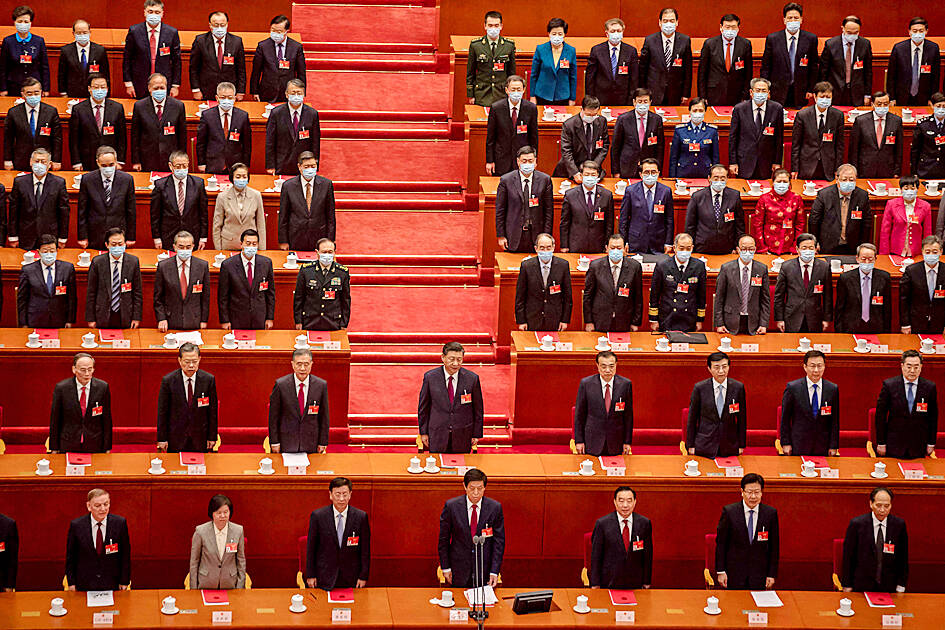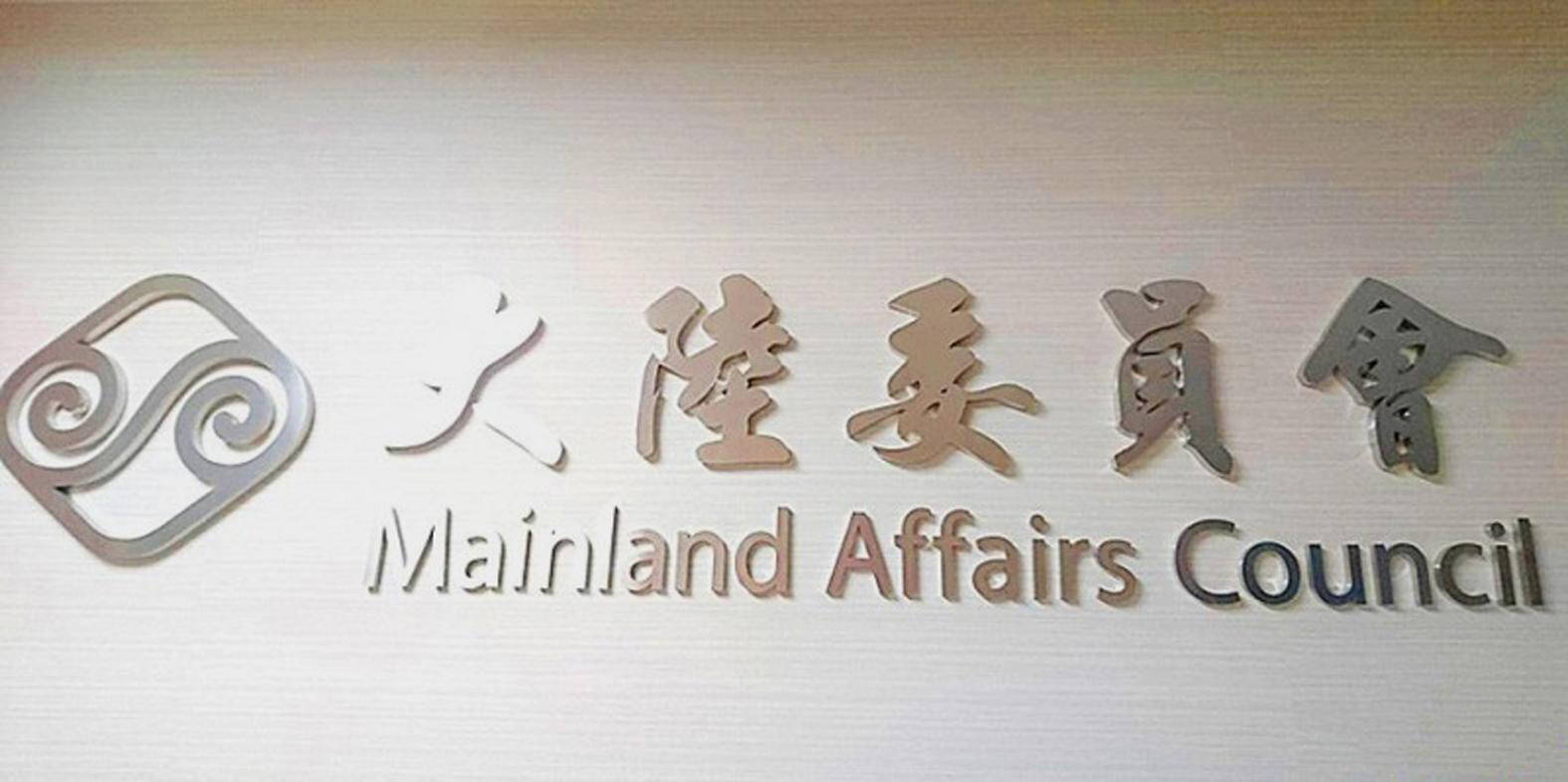Economic and political stability are Beijing’s priorities in the lead-up to the Chinese Communist Party’s (CCP) 20th National Congress on Oct. 16, a report commissioned by the Mainland Affairs Council (MAC) said.
The CCP would be focusing on touting the “significant advantages of socialism with Chinese characteristics,” and major economic and social development achievements, the report said, adding that all official propaganda apparatuses and social media platforms, as well as music, television and film productions, would therefore be “telling good stories about China,” “spreading positive energy” and doing service to “the Chinese dream that reinvigorates the Zhonghua minzu (中華民族, Chinese ethnic group).”
The CCP’s other major goal prior to the congress is “stability,” and anything that is incompatible with the government’s positive image would be “ruthlessly repressed,” the MAC report said.

Photo: AFP
Disease control measures implemented during the COVID-19 pandemic were the biggest source of instability this year, as the Chinese government imposed strict lockdowns that affected businesses and damaged economic growth, it said.
The CCP imposed tough “zero COVID” measures in cities including Shanghai, Shenzhen and Beijing, which made reaching this year’s GDP growth target of about 5.5 percent very difficult, the report said, adding that before the pandemic, private companies were already suffering due to a US-China trade dispute.
Beijing reserving the most popular positions in government agencies and state-run enterprises for CCP and Communist Youth League members only made the issue worse, it added.

Photo: Chung Li-hua, Taipei Times
As a result, a trend of “lying flat” — a concept involving inaction — emerged among young people born after 1990, it said.
These young people would rather “lie flat” than challenge social institutions, and many become “little pinks” — a term used to describe young, jingoistic Chinese nationalists on the Web — celebrating China’s achievements, attacking international businesses that support Taiwan’s independence and boycotting works or people who are suspected of insulting China, the report said.
Meanwhile, the MAC cited a report published in July by Citigroup Inc that revealed that many presold houses in China were left unfinished, prompting buyers to stop paying their mortgages and leading to a debt crisis in banks.
The problem pressured Beijing to restore stability by suppressing online discussions related to enterprises going bankrupt, bank capital issues and local governments’ debts, the MAC report said.
Moreover, two incidents in Henan Province’s capital, Zhengzhou, highlighted the flaws in China’s pursuit of stability, it said.
When Zhengzhou residents protested in the streets after four local banks froze cash withdrawals in April, their “health codes,” which are used to access public spaces as a disease prevention tool, turned red, flagging them as infection risks and banning them from going out.
Although Beijing punished five officials after the crackdown sparked a public outcry, the public realized how easily the government can deprive them of their basic needs, the report said.
Another incident happened around the first anniversary of a devastating flood in Henan, it said.
In the aftermath of the flood, a provincial official was removed from office for mishandling the incident and deliberately underreporting the deaths, it said.
Beijing banned all commemorative events this year and removed all images and videos related to the incident online, the report said.
Despite the ban, some people tried to send sunflowers to the scene and protested in creative ways, it said.
The economic slowdown, problems of unemployment and incidents in Zhengzhou might not pose threats to Beijing’s political stability in the short term, but in the long run might shake the confidence of CCP supporters regarding the party’s ability to govern, the report said.

People can preregister to receive their NT$10,000 (US$325) cash distributed from the central government on Nov. 5 after President William Lai (賴清德) yesterday signed the Special Budget for Strengthening Economic, Social and National Security Resilience, the Executive Yuan told a news conference last night. The special budget, passed by the Legislative Yuan on Friday last week with a cash handout budget of NT$236 billion, was officially submitted to the Executive Yuan and the Presidential Office yesterday afternoon. People can register through the official Web site at https://10000.gov.tw to have the funds deposited into their bank accounts, withdraw the funds at automated teller

PEACE AND STABILITY: Maintaining the cross-strait ‘status quo’ has long been the government’s position, the Ministry of Foreign Affairs said Taiwan is committed to maintaining the cross-strait “status quo” and seeks no escalation of tensions, the Ministry of Foreign Affairs (MOFA) said yesterday, rebutting a Time magazine opinion piece that described President William Lai (賴清德) as a “reckless leader.” The article, titled “The US Must Beware of Taiwan’s Reckless Leader,” was written by Lyle Goldstein, director of the Asia Program at the Washington-based Defense Priorities think tank. Goldstein wrote that Taiwan is “the world’s most dangerous flashpoint” amid ongoing conflicts in the Middle East and Russia’s invasion of Ukraine. He said that the situation in the Taiwan Strait has become less stable

CONCESSION: A Shin Kong official said that the firm was ‘willing to contribute’ to the nation, as the move would enable Nvidia Crop to build its headquarters in Taiwan Shin Kong Life Insurance Co (新光人壽) yesterday said it would relinquish land-use rights, or known as surface rights, for two plots in Taipei’s Beitou District (北投), paving the way for Nvidia Corp to expand its office footprint in Taiwan. The insurer said it made the decision “in the interest of the nation’s greater good” and would not seek compensation from taxpayers for potential future losses, calling the move a gesture to resolve a months-long impasse among the insurer, the Taipei City Government and the US chip giant. “The decision was made on the condition that the Taipei City Government reimburses the related

FRESH LOOK: A committee would gather expert and public input on the themes and visual motifs that would appear on the notes, the central bank governor said The central bank has launched a comprehensive redesign of New Taiwan dollar banknotes to enhance anti-counterfeiting measures, improve accessibility and align the bills with global sustainability standards, Governor Yang Chin-long (楊金龍) told a meeting of the legislature’s Finance Committee yesterday. The overhaul would affect all five denominations — NT$100, NT$200, NT$500, NT$1,000 and NT$2,000 notes — but not coins, Yang said. It would be the first major update to the banknotes in 24 years, as the current series, introduced in 2001, has remained in circulation amid rapid advances in printing technology and security standards. “Updating the notes is essential to safeguard the integrity